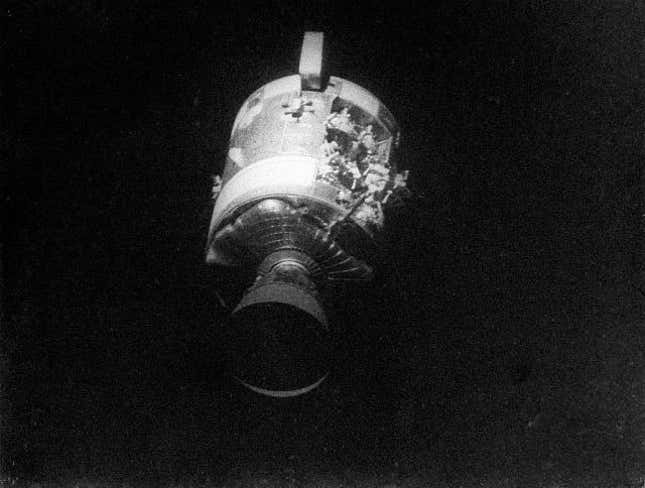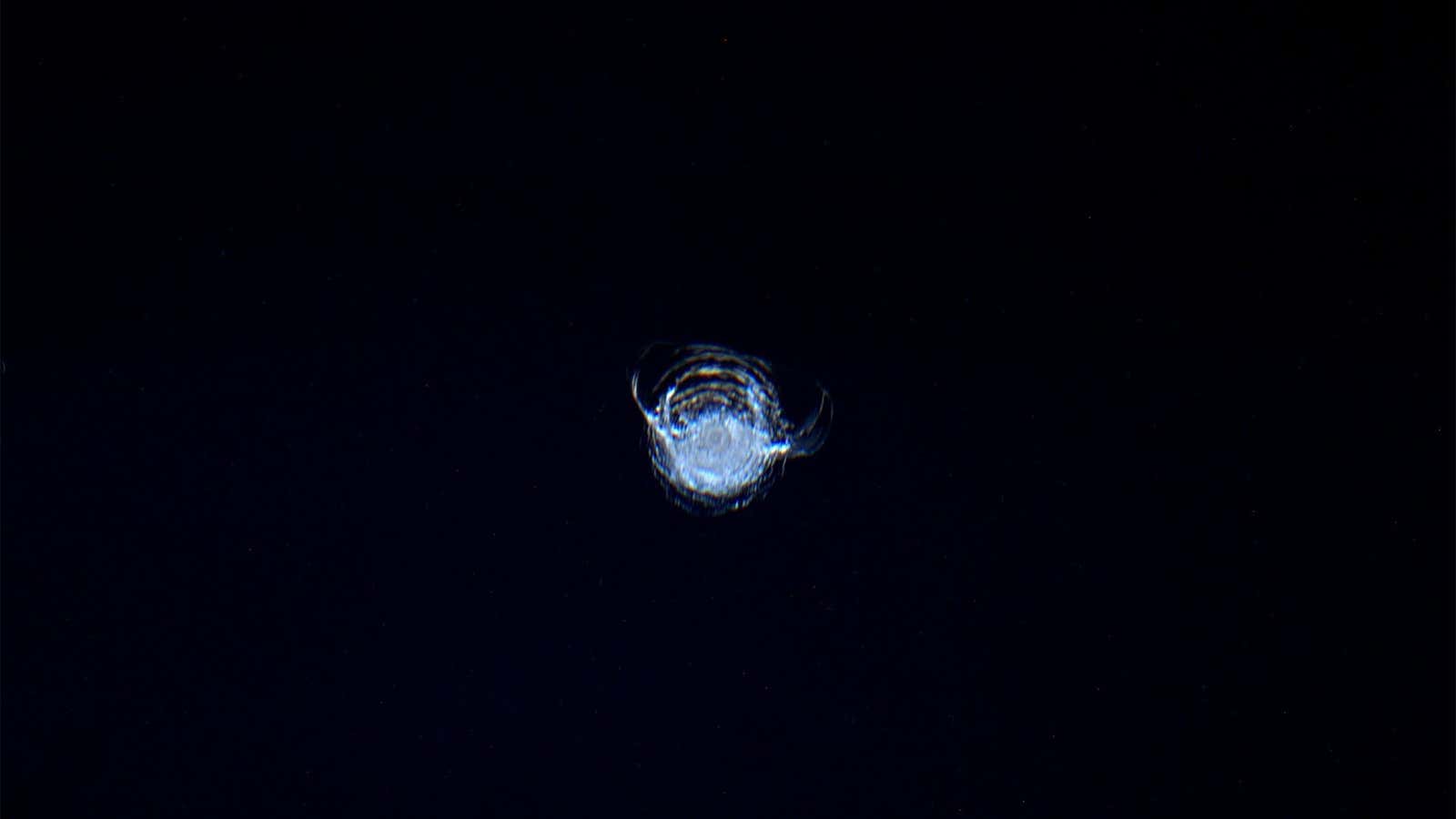Dear readers,
Welcome to Quartz’s newsletter on the economic possibilities of the extraterrestrial sphere. Please forward widely, and let me know what you think. This week: Time to ban kinetic ASAT tests, time to modify NASA SLS tests, and Axiom-1 paves the way for private space stations.
🚀 🚀 🚀
Testing weapons is a dangerous business. When the US Air Force wants to practice blowing stuff up, it uses places like the Nevada Test and Training Range, a huge swathe of the western desert where it can drop bombs far from civilians.
But when militaries want to test missiles designed to destroy satellites, they shoot down spacecraft in orbit, scattering broken pieces into the path of other satellites. It’s the rough equivalent of testing air-to-ground missiles by blowing up trucks on public highways.
In November 2021, Russia tested an anti-satellite missile by destroying one of its decommissioned satellites. The explosion created thousands of pieces of debris in orbit and forced astronauts on the International Space Station to seek emergency shelter.
One firm that tracks objects in orbit coined the term “conjunction squall” to describe what happens when the cloud of debris intersects with active satellites, creating record numbers of close passes. Operators need to maneuver their satellites away from danger, if they can, or simply cross their fingers and hope for the best.
Planet, a company with hundreds of Earth-observation satellites affected by these storms of debris, has had enough. This week, it made a formal call for the US to unilaterally halt tests of “kinetic” anti-satellite weapons (as opposed to tests of weapons that attack satellites by jamming them or frying their electronics, without physically destroying them.)
Planet is the first satellite operator to call for such a moratorium, despite the risk faced by billions of dollars of on-orbit hardware operated by more established space companies. The Satellite Industry Association, a US trade group representing dozens of companies, did not have any comment on Planet’s call for ending US satellite weapons tests. A spokesperson noted the organization condemned Russia’s test, but its list of sustainability principles doesn’t mention the topic.
While none of my sources would speculate publicly about why companies haven’t taken a harder line on anti-satellite weapons, it is clear that traditional links between the US military and space contractors make them reluctant to push an arms control policy. Another reason for complacency is that the risk of outright collision remains fairly low. But, with more and more satellites being launched, and more debris being created, the fear is that danger could increase exponentially.
“If I were the commercial sector, I’d be screaming about this,” Victoria Samson, a military space expert at the Secure World Foundation, says. “I’m surprised they are not. I fervently hope that they will follow Planet, or if the US government releases a moratorium, they will support it.”
Planet’s founders aren’t new to this problem. In 2003, CEO Will Marshall and chief strategy officer Robbie Schingler worked on the first Space Security Index, a report designed to assess whether nations were meeting treaty obligations to maintain free and safe access to space. At the time, the reduction of anti-satellite weapons testing by the US and Russia after the Cold War was cited as reducing debris in space.
But the same trends that helped Marshall and Schingler launch Planet in 2010—the growing importance of space to the military and global economy—have also increased interest in space warfare, which is documented in this recently-released Secure World Foundation report. China’s first anti-satellite test in 2007 was matched by the US in 2008. In 2019, India became the fourth nation to destroy a satellite—a move Planet condemned even as it launched satellites on an Indian government rocket weeks later. Russia’s latest test in 2021 only generated more global criticism.
There are hints that Planet’s call might see some government follow-through. Kathleen Hicks, a senior defense official, said last fall that the US “would like to see all nations agree to refrain from anti-satellite weapons testing that creates debris.” If the Biden administration pursues that policy, it may be a step towards the new norms and rules for space we hear so much about.
🌘 🌘 🌘
Imagery interlude
This week 52 years ago, the astronauts on Apollo 13 were enmeshed in their struggle to return home after an an explosion damaged their spacecraft. The extraordinary efforts to maneuver the vehicle and jury-rig a life support system became a heroic saga of the space age. It’s also a reminder of the risks faced by space-farers as we experience a resurgence in humans leaving the Earth. Below, we have the famous photo of the damaged spacecraft; mission controllers celebrating a successful splashdown; and tired astronauts after being plucked from the sea.



🛰🛰🛰
SPACE DEBRIS
A little less rehearsal. NASA resumes testing of the Space Launch System moon rocket today, but because of component failures in the vehicle, will not be able to complete all of its objectives. The space agency is reserving judgment about how it will get the data it needs to launch the rocket until after the modified test routine is complete and engineers can examine the interior of the rocket.
A small step for billionaires, a giant leap for private space stations. The Axiom-1 mission that deposited four civilians on the International Space Station over the weekend is most important as the first step towards privately owned and operated orbital habitats.
China is focusing on space warfare. A declassified report from the US Defense Intelligence Agency says China is preparing new technologies to defeat US military space capabilities, including learning how space-based assets are being used and defeated during Russia’s invasion of Ukraine. Meanwhile, SpaceX’s human spaceflight program has already deposited more people in orbit than China’s.
The fight for Space Force dollars. In one of his last acts in office, president Donald Trump moved Space Force headquarters from Colorado to Alabama, a move seen as a reward to his political allies after he claimed he made the decision “single-handedly.” An investigation into the decision by the Government Accountability Office has now been completed but not publicly released. Colorado lawmakers who have seen the report say (predictably enough) that the selection process was flawed.
The Battle of Boca Chica. SpaceX’s effort to transform its test facility in Texas into a full-fledged spaceport hit a roadblock earlier this month when the Army Corps of Engineers said Elon Musk’s company hadn’t provided the required information to receive permission to fill in wetlands and perform other construction. This week, Texas Governor Greg Abbott said he would help SpaceX win approval for its plans in order to keep the firm from conducting launches in Florida instead, though it’s not clear what exactly he could do aside from urging the company to be more forthcoming.
Your pal,
Tim
This was issue 129 of our newsletter. Hope your week is out of this world! Please send your favorite Apollo 13 memories, commercial space habitat forecasts, tips, and informed opinions to [email protected].
